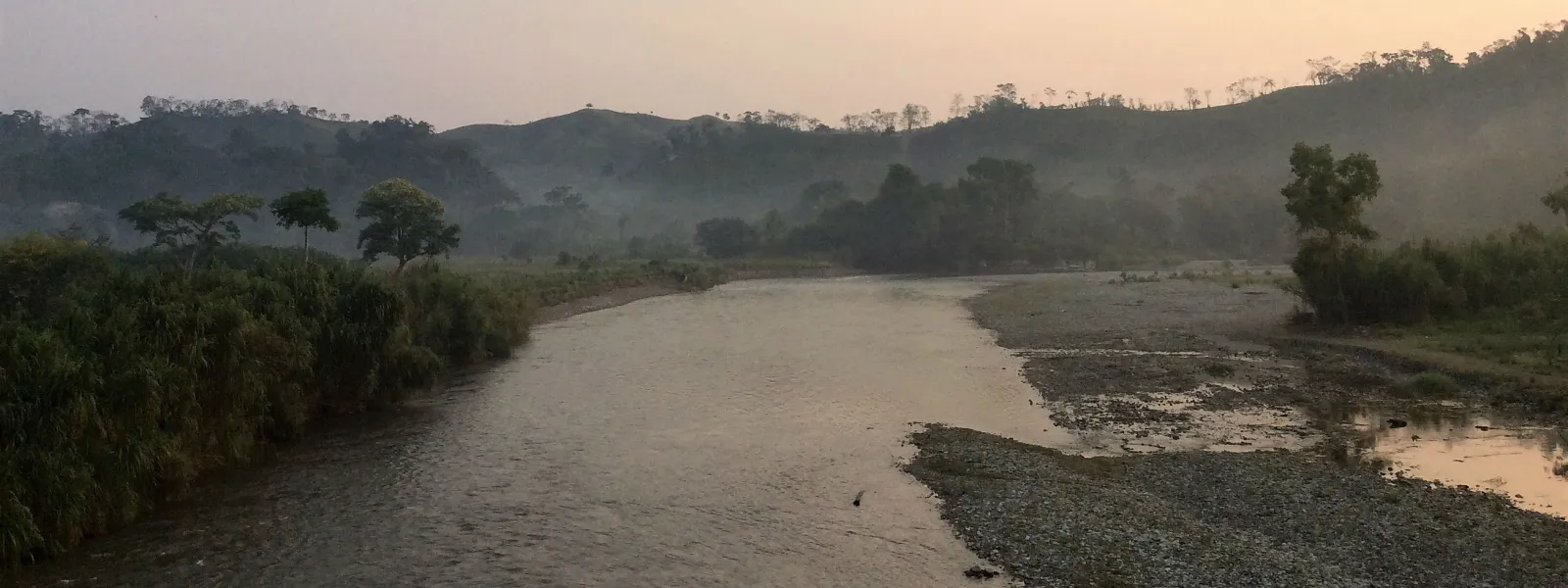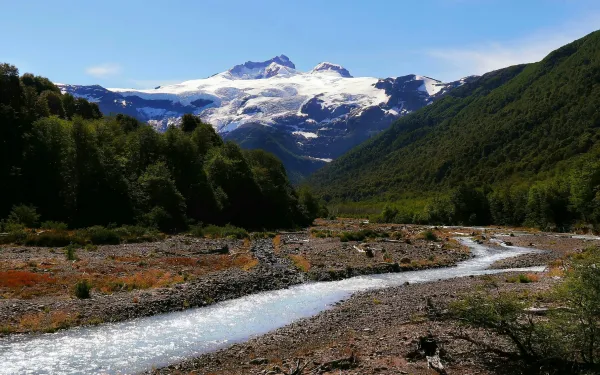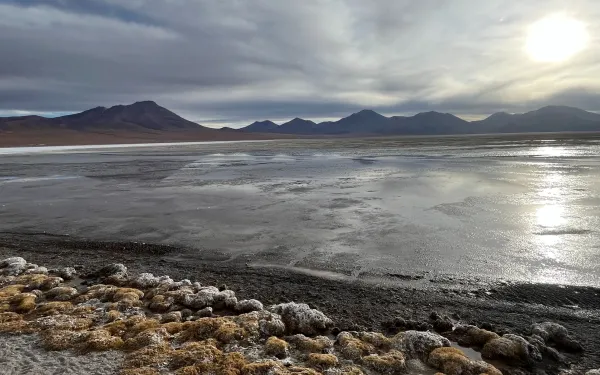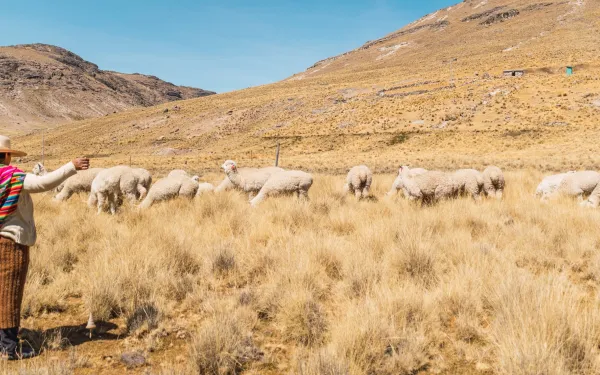
Project
Liliana Ávila /AIDAMayan women’s struggle before the Inter-American Development Bank in Guatemala
Mayan communities succeeded in getting the IDB Invest to develop a responsible exit plan after withdrawing its financing for two hydroelectric projects that negatively impacted ecosystems and the livelihoods of indigenous peoples, especially women, in the micro-region of Yichk'isis (Ixquisis).
In the struggle to defend their water, territory and way of life, indigenous Mayan communities in the Yichk'isis (Ixquisis) micro-region of northern Guatemala convinced the Inter-American Development Bank Group to withdraw its financing of two hydroelectric dams whose implementation violated their rights. The decision was also significant in that the IDB, for the first time, designed a responsible exit plan.
That historic advance was the result of the complaint that the communities filed in August 2018—with the support of AIDA, the Plurinational Ancestral Government of the Akateko, Chuj, and Q'anjob'al Native Nations, and the International Platform against Impunity. The complaint was filed with the Independent Consultation and Investigation Mechanism (MICI), the IDB Group's accountability office.
In resolving the case in September 2021, the MICI concluded that IDB Invest failed to comply with its own operational policies and safeguards, in the framework of the financing granted to the company Energía y Renovación S.A. for the implementation of the San Mateo and San Andrés hydroelectric projects.
Learn more about this achievement
In the mountains of Northwestern Guatemala, near the border with Mexico, the land is rich and fertile. Several important rivers and many other water sources feed the soil.
The residents of these mountains, many indigenous women of Mayan descent, have long depended on the waters to nourish them, to provide them with fish, as well as for agriculture, sanitation, and cooking.
But the construction of the San Mateo and San Andres dams has caused water scarcity and the contamination of rivers and other natural resources long cherished by the communities.
The near lack of water has also drastically reduced harvests, lessening the income gained from selling corn, wheat, beans, coffee, sugar cane and other products in the market. As a result, the conditions of poverty in the area have deepened.
And the risk situation is profound, particularly for women, who have played a very important role in the defense of water and territory threatened by hydroelectric projects, and are therefore victims of intimidation and stigmatization.
As guardians of their land and water, they have come to its defense and they’ll continue to prevent environmental deterioration from further harming their families.
Read our fact sheet on the case

Related projects

Mapuche defend against extractive industry and forced evictions from ancestral lands in Argentina
Mapuche communities urge Inter-American Commission on Human Rights to further investigate abuses at nexus of extractive industry and land dispossession.Río Negro, Neuquén, Mendoza, Argentina - Organizations of the Indigenous Mapuche People addressed the urgent situation arising from conflicts with extractive projects on Indigenous land in Argentina in a public hearing before the Inter-American Commission on Human Rights today. The human rights body of the Organization of American States heard testimony of those impacted by mining, oil, and gas projects that have been compounded by the lack of territorial recognition, ongoing evictions, and the criminalization of indigenous communities."The rapid expansion of extractive projects across ancestral Mapuche territories in Argentina is driving the eviction of our communities as projects proceed without their free, prior, and informed consent," emphasized Mirta Ñancunao y Hugo Aranea, werken (spokespeople) of the Mapuche-Tehuelche Parliament of Río Negro. This includes new mining projects across 1,800 square kilometers in Malargüe, oil and gas developments stretching 600 kilometers along the Vaca Muerta shale formation in Neuquén, and at least 53 new mining and energy projects in Río Negro, particularly in the Calcatreu open-pit gold and silver mining project, which threatens nearby water sources."The exploitation of natural resources has been accompanied by the intention to vacate traditional territories," said Lorena Bravo of the Mapuche Federation of Neuquen, Xaunko Regional Council. "The evictions have direct consequences including preventing the use of and access to land, sacred sites, impacts to health, access to water, impacting indigenous economies and traditional practices."Gabriel Jofré, werken of the Malalweche Organization, asserted that the "advance of extractive companies into the traditional territory of Mapuche communities is predicated on the lack of effective state recognition of Mapuche communities." He emphasized that the state has dismantled the processes used by Mapuche communities to assert their territorial rights, including the recognition of their legal status. Jofré also noted that the national government rolled back protections in Law 26.160, which had suspended evictions of recognized indigenous communities."The advance of land extraction is not possible without installing a racist and discriminatory discourse," which Jofre maintains endangers human rights and environmental defenders. Both national and provincial politicians have fueled racist and hateful discourses against Mapuche communities, labeling them "terrorists" and denying their Indigenous identities. This rhetoric has further stigmatized Indigenous defenders and increased the risks they face for engaging in rights advocacy.The communities urged the Commission to further investigate human rights violations occurring at the intersection of extractive industry expansion and the dispossession of Mapuche communities from their ancestral lands. In December 2024, the Commission issued a public statement calling on Argentina to respect the land rights of Indigenous Peoples.Organizations participating in the hearing included the Malalweche Organization from Mendoza, The Mapuche Confederation of Neuquén, and the Coordination of Mapuche Parlement of Río Negro, with support from the Observatory on the Human Rights of Indigenous Peoples, and the Interamerican Association for Environmental Defense. Earthjustice has partnered with the Malalweche Organization in defending territorial rights of the Mapuche people since 2022.Entre las organizaciones que participaron en la audiencia se encuentran la Organización Malalweche de Mendoza, la Confederación Mapuche de Neuquén y la Coordinadora del Parlamento Mapuche de Río Negro, con el apoyo del Observatorio de Derechos Humanos de Pueblos Indígenas, la Asamblea Permanente por los Derechos Humanos (APDH), la Asociación Interamericana para la Defensa del Ambiente (AIDA) y Earthjustice.Press contactVíctor Quintanilla (Mexico), AIDA, [email protected], +52 5570522107
Read more
Human rights and the rights of nature in the governance of minerals for the energy transition
A reading of Advisory Opinion 32 of the Inter-American Court of Human Rights by the Andean Wetlands Alliance The Inter-American Court of Human Rights (IACHR) outlined in its Advisory Opinion No. 32 (OC-32), released on July 3, 2025, how human rights must be upheld in the face of the climate emergency. The Court also recognized the rights of nature and the responsibilities of States and companies regarding climate change. This advisory opinion followed more than 150 oral interventions and over 260 written submissions—including those from organizations that are part of the Andean Wetlands Alliance.This pronouncement sets a course for protecting valuable ecosystems and the rights of people in Latin America, a region deeply affected due to its significant reserves of minerals increasingly in demand for the global energy transition.Human rights and "critical" mineralsThe IACHR, a central institution in setting human rights standards for Latin America and the Caribbean, provided through OC-32 a set of tools for moving toward policies grounded in equity and justice. These tools align with the principles put forward by the UN Secretary-General in relation to the minerals value chain for the energy transition.Minerals such as lithium and copper are at the heart of current energy transformation policies due to their value for battery manufacturing. This value chain begins in territories such as the high Andean wetlands of Argentina, Bolivia, and Chile, with the exploration and extraction of mineral deposits. It continues with their processing and refining in specialized facilities for the production of cells, which are later integrated into batteries that power a range of devices—mainly individual electric vehicles.The Court placed special emphasis on the protection of human rights during the extraction of so-called “rare or critical” minerals for the energy transition, which make up the first links in this value chain. This directly reflects Principle 1 of the 2024 Report of the UN Secretary-General’s Panel on Critical Minerals for the Energy Transition and offers a key legal instrument for protecting human rights in Latin American countries. It also outlines essential elements for respecting the integrity of ecosystems (Principle 2) from the most biodiverse region on the planet, as well as advancing justice and equity (Principle 3), transparency and accountability (Principle 6), and strengthened multilateral cooperation (Principle 7).Rights of Nature in a Megadiverse RegionAmong its conclusions, the Court recognizes the rights of nature, referring to the need to preserve its essential ecological processes. This contributes to consolidating a development model that respects planetary boundaries and ensures the availability of vital resources for present and future generations.This recognition is especially critical in Latin America, one of the most biodiverse regions in the world. It holds 50% of the planet’s biodiversity in ecosystems such as wetlands and tropical forests—especially the Amazon. It is home to 12 of the 14 terrestrial biomes and is a key epicenter for nature’s contributions to people.These issues are particularly relevant for a region whose historical role as a provider of natural resources has helped build the global economy, yet at great cost—causing severe ecosystem damage and violating community rights. The protection of nature’s rights provides a central tool for managing the mineral wealth essential for the energy transition, especially given that the region holds more than 50% of the world’s lithium reserves and 40% of its copper reserves.Latin America is also one of the most culturally diverse regions: approximately 54.8 million Indigenous peoples live across its territories, representing 8.5% of the total population—the highest global proportion relative to total population—and occupying over 20% of the land.OC-32 particularly highlights the role of communities in preserving ecosystems and a healthy climate, free from human interference. It acknowledges the importance of local, traditional, and Indigenous knowledge for informed decision-making and cultural preservation. This approach empowers local and Indigenous communities—long-standing guardians of ecosystems who possess deep traditional knowledge—yet who are often excluded from decision-making processes and denied their rights to free, prior, and informed consultation and participation.The right to a healthy climate: Promising newsOC-32 recognizes the right to a healthy climate as part of the broader right to a healthy environment, free from human interference. States are thus required to prevent any irreversible harm to the planet’s ecological balance and exercise heightened due diligence—taking into account the degree of potential harm, the best available science, and the specific vulnerabilities of at-risk groups, without creating or exacerbating such vulnerabilities.In their mitigation strategies, States must prioritize both people and ecosystems—particularly those that play a vital role in regulating the Earth’s climate systems and natural cycles.In this regard, the Court’s acknowledgment of the Andean wetlands of Argentina, Bolivia, and Chile is especially significant. These ecosystems contribute to climate adaptation through water regulation. They also have the capacity to mitigate climate change by acting as carbon sinks: studies have recorded significant levels of carbon dioxide absorption through their vegetation and extremophile microorganisms.Ironically, these very wetlands are now under threat from the expansion of mining for the energy transition.Corporate Obligations on Human RightsOC-32 makes it clear that, in addition to States, companies also bear obligations concerning the climate emergency and its impact on human rights. The Court calls on States to regulate and oversee corporate due diligence across the entire value chain, in accordance with the UN Guiding Principles on Business and Human Rights (UNGPs). These obligations include identifying, preventing, mitigating, and accounting for business-related impacts on the environment, climate, and human rights. These are non-transferable obligations—they cannot be outsourced to third parties, such as certification bodies. The advisory opinion also calls for the avoidance of greenwashing and undue influence from third-party actors in corporate decision-making.A perspective on Advisory Opinion 32 from the Andean wetlandsSpanning more than 200 pages, OC-32 provides tools to ensure the protection of human rights throughout the mineral value chain, as well as the integrity of ecosystems, from a Latin American perspective. It also promotes implementation of the UN Secretary-General’s Panel principles on critical minerals for the energy transition.No less important, it upholds the interdependence of democracy, the rule of law, and human rights protection within the Inter-American system, and strengthens the role of access rights and the protection of human rights, environmental, and climate defenders, in accordance with the Escazú Agreement. This recognition is especially crucial for the most dangerous region in the world for defending nature.In a context of climate denialism, fueled by political leaderships that reject humanity’s role in the climate crisis, OC-32 stands as a vital roadmap to urge States to meet their climate commitments through a human rights-based approach.From the Andean Wetlands Alliance, we view this opinion with hope—as a key tool to help ensure the rights of those who have inhabited these wetlands for generations and to protect these vital ecosystems. Reactions from Members of the Andean Wetlands Alliance to Advisory Opinion No. 32 of the Inter-American CourtPía Marchegiani, Deputy Executive Director, Fundación Ambiente y Recursos Naturales (Argentina):"In a context where discussions on critical minerals are increasingly shaped by security and military interests, and unilateral or bilateral agendas from the Global North seek to control mineral supply chains, the Inter-American Court has taken a clear, strategic step in defining how the balance must be struck: placing human rights and nature at the center. Only in this way can we move forward toward justice and equity, as proposed by the UN Secretary-General’s Panel on Critical Minerals."Ricardo Frez, Director, ONG Defensa Ambiental (Chile):"This unprecedented recognition of nature as a rights-bearing subject marks a shift toward ecocentric approaches in international human rights law. It is especially significant amid the growing—and often irreversible—impacts of mining for critical minerals like lithium and copper in the Global South. The Court affirms the autonomous protection of nature, not only as a means to secure human rights, but as an end in itself. It reinforces States’ obligations to prevent irreparable climate and environmental damage. In a context where the energy transition risks replicating extractivist models, this advisory opinion provides crucial normative tools to defend territories and life."Vivian Lagrava Flores, Empodérate, Human Rights Collective (Bolivia):"Although communities may not be familiar with technical terms like climate, energy transition, and so on, they have welcomed with hope the fact that Advisory Opinion 32/25 places greater obligations on States. Laws, constitutions, and human rights standards are being ignored, while all kinds of impacts are overlooked. Wetlands—especially freshwater bofedales—are nature’s miracle that sustains our way of life and are essential for mitigating climate change. Yet they are being destroyed by extractivism. The Bolivian State must grasp the magnitude of its obligations."Ezio Costa Cordella, FIMA NGO (Chile):"The concept of a just transition appears in several parts of the advisory opinion issued by the Inter-American Court of Human Rights. There is a specific and explicit mention of this type of transition, and the Court refers to the obligation of States to uphold this principle when developing climate policies and strategies. This means they must avoid deepening situations of multidimensional poverty and instead assess how a transition will affect a given territory and the people who live there—including, of course, the workers in industries undergoing change. In this sense, it is important to understand that the ecological transition is not limited to policy measures; it also concerns how a range of social systems, including those of production and consumption, will adapt to the new climate and environmental reality. In this process—from the present state of affairs to what will emerge as a result of this new environmental condition—we must ensure that no further violations of human rights occur. On the contrary, we should create conditions that lead to better protection and fairer distribution of those rights."Oscar Campanini, CEDIB (Bolivia):"The advisory opinion of the Inter-American Court is an enormously important reinforcement of civil society’s defense of the environment, water, Indigenous peoples’ territories, and life itself—a defense that benefits not just specific groups but is, in fact, the only way to ensure our survival as a species. In the case of the high Andean plateau, this opinion supports the struggles of communities defending water and wetlands against growing pressure from critical mineral extraction projects such as lithium."Verónica Gostissa, Asamblea PUCARÁ (Argentina):"We are at a turning point for climate justice and human rights. The Inter-American Court now recognizes the autonomous right to a healthy climate. In regions like northwest Argentina—where ecosystems of high ecological value, such as high Andean wetlands, coexist with intense extractive pressures from lithium mining—this decision directly challenges the current mining and energy model. This legal milestone reinforces a truth that communities and peoples have long upheld: if it dries up rivers, it’s not an energy transition. And there can be no true transition without environmental justice."Paulina González Quiroga, Fundación Tantí (Chile):"We deeply value the statement issued by the Inter-American Court at a strategic moment for our bodies and territories, especially for those of us living in the Global South—in the highland and coastal desert regions of Chile. This is a mining and productive zone where both continental and marine waters are being affected by the entire value chain operating in the area. In our territory, marked by a history of environmental sacrifice, there is no real transition. On the contrary, the same communities and ecosystems are now facing an intensification of extractivist practices—now labeled ‘green.’ We are witnessing an unimaginable increase in the impacts on our high Andean and marine ecosystems, and on the ways of life that exist here. In this context, the Court’s opinion will be crucial in strengthening the legal defense of our territories in various processes of Indigenous consultation and environmental justice that are already underway and will undoubtedly continue within the framework of these policies." Yeny Rodríguez, senior attorney and Line Coordinator, Interamerican Association for Environmental Defense (AIDA)"The Advisory Opinion No. 32 of the Inter-American Court recognizes the high degree of vulnerability and risk in which strategic ecosystems in Latin America are found for the water cycle and climate, such as the Andean salt flats, and sends a very clear message to the governments of the region and to the companies operating in our territories: in application of enhanced due diligence, they must avoid mining activities that could generate irreversible damage to ecosystems and aggravate the situation of vulnerability of indigenous peoples or communities at risk."
Read more
The Inter-American Court's Opinion: 7 reasons it matters for climate justice
On July 3, the Inter-American Court of Human Rights released its long-awaited Advisory Opinion No. 32 (OC-32), clarifying the scope of States' obligations in the face of the climate crisis – including, among other responsibilities, the duty to guarantee the right to a healthy climate.This marks the first time that a regional human rights court has made a broad and comprehensive statement on the issue of climate change.The opinion was issued in response to a request submitted by the governments of Chile and Colombia in January 2023. It is also the outcome of an unprecedented participatory process within the Inter-American Human Rights System, in which dozens of States, civil society organizations, Indigenous peoples, activists, and academics engaged through oral statements in public hearings and a record number of written submissions.Below are seven reasons why this landmark decision — written in and for Latin America — represents a turning point for climate justice in the region and beyond. 1. Clarifying States’ legal obligations in the face of the climate emergencyIn its decision, the Court affirms that the world is currently experiencing a climate emergency—a crisis driven by human activities, unequally generated by different States, and one that progressively and severely impacts people, especially those in vulnerable situations.In response, the Court underscores that States have binding legal obligations—not merely voluntary commitments—to confront this emergency with “urgent and effective actions, articulate, with a human rights perspective, and under the prism of resilience.” This means that, amid the climate emergency, States are required to respect and guarantee human rights. 2. Recognizing the human right to a healthy climateFor the first time, the Court explicitly recognizes the autonomous human right to a healthy climate, derived from the broader right to a healthy environment. This recognition establishes that States must protect the ability of both present and future generations to live in a climate system free from dangerous human-caused interference.Protecting this right—which underpins the enjoyment of other human rights—also requires honoring the principle of intergenerational equity. In practice, this means that States must act today to ensure that future generations inherit conditions of environmental stability that allow for equal opportunities for well-being and development. 3. Strengthened protection for people in vituations of VulnerabilityAdvisory Opinion No. 32 establishes that States must ensure that individuals and groups in situations of particular vulnerability — including women, children, Indigenous peoples, Afro-descendant communities, peasant and fishing communities, older adults, persons with disabilities, LGBTIQ+ individuals, and human rights defenders, among others — are able to exercise their rights on equal terms in the face of climate impacts.The Court also recognizes that certain territories in the Americas — such as the Amazon, the Insular Territories, and Caribbean States — are especially vulnerable to the effects of climate change. 4. Emissions control and regulation of business activitiesAccording to the opinion, States are required to set clear greenhouse gas (GHG) mitigation targets and maintain an up-to-date mitigation strategy grounded in human rights. They must also tighten and rigorously regulate both public and private activities that produce GHG emissions.In line with these mitigation strategies, States must determine which projects or activities require an environmental impact assessment that explicitly evaluates potential climate impacts. 5. Protecting human rights within the energy transitionAdvisory Opinion No. 32 underscores that States must safeguard human rights from potential violations linked to the extraction of minerals and other resources necessary for the energy transition.The Court also affirms that States are obligated to ensure the fair distribution of both the burdens of climate action and the impacts of climate change. This includes avoiding disproportionate burdens on certain populations — for example, in how the costs of the energy transition are allocated. 6. Recognition of traditional knowledge in climate actionThe opinion recognizes local, traditional, and Indigenous knowledge as protected under Inter-American human rights treaties and as a key part of the best available science. This recognition opens new avenues for demanding the inclusion of such knowledge in climate solutions.The Court thus reaffirms that the right to science also encompasses the intellectual and practical contributions that Indigenous peoples, Afro-descendant communities, and other local groups have sustained and safeguarded over generations. 7. Advancing the global movement for climate justiceThis decision reinforces and builds upon earlier rulings, such as the one issued in May 2024 by the International Tribunal for the Law of the Sea, which clarified States’ obligations to protect the marine environment from the effects of the climate crisis. It also contributes to ongoing global legal efforts — including the forthcoming Advisory Opinion from the International Court of Justice, which will further define States’ responsibilities in the face of the global climate emergency.Together, these decisions are strengthening the global movement for climate justice, as well as supporting citizen demand for stronger government action.
Read more